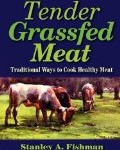The Hippocratic Alternative — Food
By Stanley A. Fishman, author of Tender Grassfed Meat and Tender Grassfed Barbecue
With the current controversy over medical insurance, our nation seems fixated on drugs and medical treatment as being the only way to maintain health. No doubt drugs and medical care can be necessary under certain circumstances, especially trauma.
But they are not the only way to stay healthy, under normal circumstances. The most famous and successful physician of ancient times, Hippocrates of Kos, had a very different approach.
“Let food be thy medicine and medicine be thy food.â€
Modern Medicine
Modern medicine has a one-size-fits-all approach to disease. Every patient who is diagnosed with a particular disease is supposed to receive the same treatment. One size fits all. Often the same dose of drugs is prescribed with no regard for the body weight of the patient.
Usually, food is never even considered when treating illness. Drugs are the treatment of choice, though surgery is often used. The majority of treatments used for most illnesses are not even designed to cure the disease, but to help the patient “manage” the disease, by suppressing the symptoms. Many people have bad reactions to various drugs, called “side effects.” This can result in the prescription of yet another drug, which could have bad effects on the patient, which could lead to the prescription of yet another drug.
According to the Mayo clinic, and to CBS news, 70 percent of Americans take at least one prescription drug. And many of these people take several prescription drugs. This statistic does not even consider over the counter drugs, which are also widely used.
Yet this huge amount of drug use has not resulted in good health for the American population.
Let me make this clear. Modern medicine can achieve some amazing results, such as reattaching severed fingers and limbs, and saving the lives of those who have suffered trauma. Yet in many instances, it “manages” rather than cures.
Hippocratic Medicine
Hippocrates had a very different approach. Greek medicine of his time was far more advanced than most people realize, and did use drugs and surgery. Contemporary Greek writings show that Greek citizens led long lives, often recovered from serious wounds, and were expected to put on heavy armor and fight in brutal hand-to-hand combat when needed, even into their seventies. Great emphasis was placed on personal cleanliness, and Greek doctors were very skilled at disinfecting and treating battle wounds, and many other injuries. They had many medications, compounded from plants and other substances, and were skilled at performing many kinds of surgeries.
Hippocrates was the most successful doctor of his time, and became famous. He became so famous that he was asked to come to Athens to stop a plague that was killing many people while the city was under siege. Hippocrates cured the plague, and ended the epidemic, by, among other things, getting the people to boil their drinking water.
Yet Hippocrates believed in treating most illness with what he called “regimen,” using food, exercise, massage, sleep, and relaxation as the treatments of choice. Only if these methods failed, or if the patient was incapable of using them, would drugs be used. Surgery would be done only if there was no alternative. Each patient was considered to be a unique individual, and the treatment would be customized for the unique condition of each patient. Hippocrates had great success in using these methods.
Many Greek physicians resisted his methods, because, then, as now, it was much more profitable to use drugs and surgeries.
This led Hippocrates to create new moral standards for physicians, placing the welfare of the patient before the profit of the doctor. These standards were set forth in the oath he created for doctors, the famous Hippocratic Oath.
In the 1930s, Dr. Weston A. Price studied many peoples who were eating the traditional diets of their ancestors. In every case, these people had perfect teeth, and none of the chronic diseases that plague our culture. This research is direct proof of Hippocrates’ belief that food was the best way to prevent and treat many illnesses.
What We Can Learn from Hippocrates
Modern medicine is too focused on drugs, radiation, and surgery as the only way to treat illness. I believe we could greatly drive down the cost of medical care, and be a much healthier nation, if doctors were actually trained in the Hippocratic methods of healing, and were required to be just as familiar with the healing effects of real food as they are with drugs. In fact, our whole society needs to relearn and use the benefits of eating real food, rather than modern factory foods.
Many individuals have reported enjoying good health and curing all kinds of illness just by eating the right foods, and avoiding the wrong foods.
We can still use modern medical methods when needed, but I believe they would be needed far less often, if our population was well nourished, and if doctors used Hippocratic regimen as the treatment of choice (when possible).
We would also have more success if we abandoned the “one-size-fits-all” approach, and treated each patient as a unique individual.
Finally, we need to return to the moral standards set down by Hippocrates. The main motive of doctors should be to heal people, not to make money. People who are mainly concerned with making money should go elsewhere. People who truly want to heal should be the doctors. The welfare of the patient must come before the profit of the doctor.
This post is part of Fat Tuesday, Real Food Wednesday and Fight Back Friday blog carnivals.
The First Low-Carb Doctor—2500 Years Ago!
By Stanley A. Fishman, author of Tender Grassfed Meat

 photo credit: bazylek100
photo credit: bazylek100
Dr. Robert Atkins is credited (or blamed) for creating the low-carb diet. But Dr. Atkins was not the first to advocate a high-fat, high-protein, low-carb diet for losing weight.
The father of medicine was also the father of low-carb. Hippocrates of Kos, the most famous and honored doctor of all time, known as the “Father of Medicine†was the first to advocate a low-carb diet for losing weight.
Who Was Hippocrates?
Hippocrates was born in the middle of the fifth century before Christ. He revolutionized the practice of medicine in ancient Greece. At that time, there was a conflict in Greek medicine. There was a division between those doctors who relied on aggressive, dangerous treatments like drugs and surgery (yes, the ancient Greeks used both), and those who saw illness as a punishment from the gods and advocated religious means for healing. Hippocrates created a new path for healing.
Hippocrates studied his patients by observing them, taking careful notes, and using his experience to diagnose their conditions. His approach was centered on strengthening the patient through food, exercise, and rest, so the patient’s body could heal itself. Some other techniques used to strengthen the body included massage, inhaling various fragrances, soft music, relaxation, even gentle conversation designed to help calm the patient, and other similar techniques.
Hippocrates taught that it was more important to know the patient’s body and how to strengthen it, than to know the disease the patient had. Hippocrates taught that the body had the power to heal any illness, if the natural processes were properly supported.
The Hippocratic way of healing always started with diet and exercise. Only if those did not work was medication used. The use of medication was stopped when the patient was well enough to respond to diet and exercise. Surgery was the last resort. The doctor was instructed that every patient was a unique individual, and treatment had to be designed for each particular patient. This was the total opposite of today’s “same treatment for the same disease for everybody†approach.
Hippocrates taught that the patient should be treated with kindness, respect, love, and understanding, and knew that a person’s mental attitude had a great deal to do with the healing process.
Hippocrates believed that aggressive medical treatment could do great harm to the patient, and said that the most important rule for the physician was, “First, do no harm.â€
Why Was Hippocrates Considered the Greatest Doctor of All Time?
Hippocrates was considered the greatest doctor of all time, because he was so successful in treating illness. While he did not cure everybody, he cured so many that he became recognized as the greatest and most successful doctor of antiquity, perhaps of all time.
Hippocrates became particularly famous when he was credited with stopping the great plague that hit Athens during the Peloponnesian War. Athens was under siege, with large numbers of people and animals crowded together. All food had to be brought in by sea, and there was a shortage of fresh food. A terrible plague broke out, killing thousands. The drugs and treatments of the conventional doctors proved useless, as did trying to appease the Greek gods. Hippocrates and his followers came to Athens to try to cure the plague, as it was feared that this terrible disease would wipe out Athens and threaten the very survival of the rest of Greece.
Diet and exercise would not work here, as the victims of the plague were too sick to keep food down, or to exercise. Hippocrates carefully observed the situation. He noticed that the only group of people not affected by the plague were the blacksmiths and their workers. Hippocrates noted that the blacksmiths spent a great deal of time around burning fires, and often drank warm water that had been brought to a boil, since they were always around hot fires. Hippocrates gave these instructions to the people of Athens:
- They were to light large fires in every home, and keep them burning.
- All corpses were to be burned completely.
- All water was to be boiled before drinking.
The people of Athens followed his prescription, and the plague soon ended.
I should mention that modern doctors and historians call this a legend, refusing to believe that an ancient physician could cure the plague. After all, he had no modern drugs or antibiotics. Any end to the plague must have been a coincidence that had nothing to do with Hippocrates. But the people who were actually there gave credit to Hippocrates, and considered him the greatest doctor in the world.
How to Lose Weight—“Let the Foods Be Richâ€
Hippocrates lived in a time when many people were fat, and wanted to lose weight. He said: “People who wish to become thin should let the foods be rich.â€
Hippocrates believed that a diet consisting of rich foods would satisfy the appetite, giving the body what it needed so the patient would not eat too much. “Rich food†in his day meant the fat from grassfed animals and pigs, fatty cheeses, and fatty meats. By limiting his patients to the rich foods, he was putting them on a low-carb diet, a diet that was very similar to the one advocated by Dr. Atkins, 2500 years later!
Hippocrates also cautioned doctors to avoid a “one size fits all†approach to weight loss. He stated that each patient had a natural weight that was ideal for that person. The goal was to reach the degree of thinness that the patient’s body would support, and maintain naturally with a good diet.
By advocating that each patient reach the level of thinness that was right for them, Hippocrates rejected the idea that every person must reach the same degree of thinness. The modern idea of identical thinness for everyone has caused so much pain and misery, causing the horrible cycle of drastic weight loss followed by drastic weight gain that is so common today. This horrible cycle is repeated by person after person, resulting in huge profits for the diet industry.
It should be noted that Hippocrates prescribed various diets to help sick people. Sometimes he would prescribe a diet that contained carbs, and sometimes he would put a patient on an all-barley diet for a short period, but not for weight loss. As always, he customized his treatment to the individual patient.
Hippocrates Said
Some of the quotes from Hippocrates really show his philosophy, and are completely consistent with the alternative doctors of today:
“Let food be thy medicine, thy medicine shall be thy food.â€
“Leave your drugs in the chemist’s pot, if you can cure the patient with food.â€
“Walking is man’s best medicine.â€
The Hippocratic Oath
Hippocrates is famous for establishing a code of ethics for the medical profession, which was embodied in an oath he wrote for all physicians to take.
There was a time when all Western doctors took the oath, though many did not honor it. The modern version of the Hippocratic Oath does not even resemble the oath written by Hippocrates, and is completely different.
To me, the most important part of the original Hippocratic Oath is stated in this paragraph:
“I will use those dietary regimens which will benefit my patients according to my greatest ability, and judgment, and I will do no harm or injustice to them.â€
In other words, doctors used to take an oath to heal with diet! Not drugs, radiation, or surgery, but diet.
Hippocrates and the Research of Dr. Weston A. Price
The healing approach of Hippocrates, based on a healthy diet that supports the natural functioning of the body, is completely consistent with the findings of Dr. Weston A. Price.
Dr. Weston A. Price studied a number of healthy peoples who ate the diet of their ancestors. All of these peoples followed the Hippocratic method of using diet to support the natural functions of their bodies. All of these peoples were completely free of the chronic diseases that plague the modern world. All of these peoples ate a diet that was much higher in animal and fish fat, and much lower in carbs than modern diets. And all of these peoples were in great physical shape, with obesity being unknown.
Dr. Robert Atkins, the founder of the modern low-carb diet, had been demonized, vilified, and heavily criticized. His critics constantly claimed that his findings had no support in science or history. They were wrong, as the greatest physician of all time, Hippocrates of Kos, also prescribed a low-carb diet for losing weight, using very much the same approach as Dr. Atkins.
Related Posts
How Grassfed Meat Helps Weight Loss
This post is part of Real Food Wednesday, Fight Back Friday and Monday Mania blog carnivals.


 Photos of recipes from the new book Tender Grassfed Barbecue
Photos of recipes from the new book Tender Grassfed Barbecue
 Photos of recipes from the cookbook Tender Grassfed Meat
Photos of recipes from the cookbook Tender Grassfed Meat
